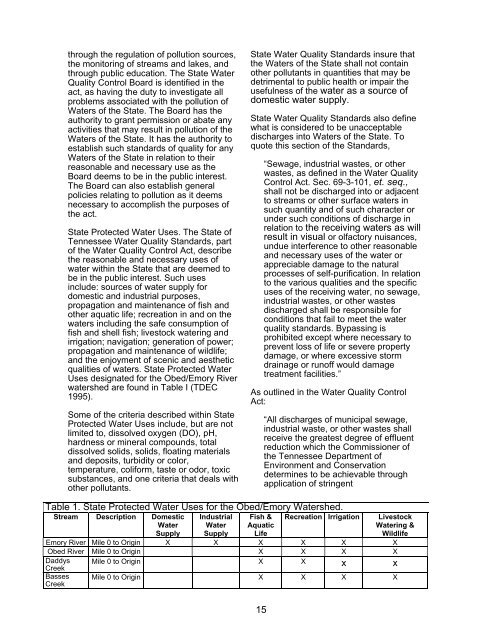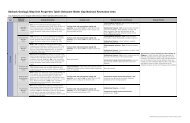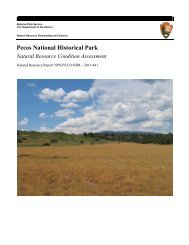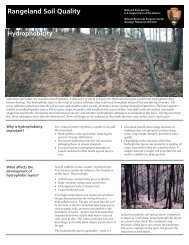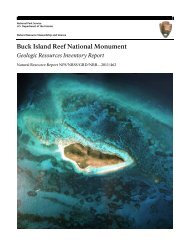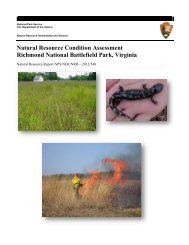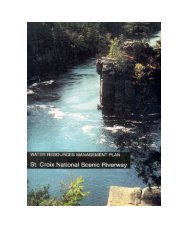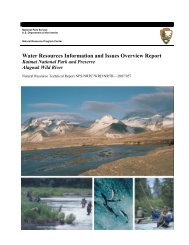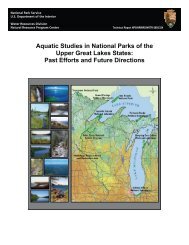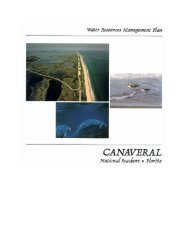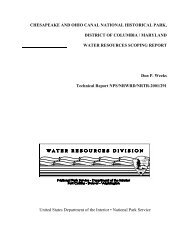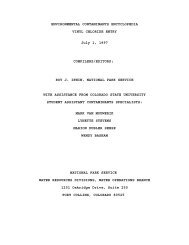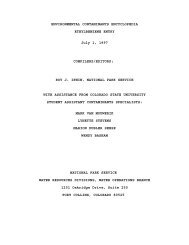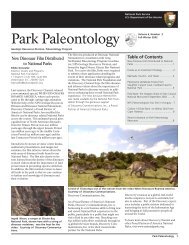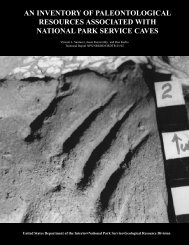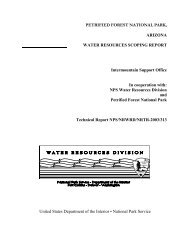Obed Wild and Scenic River - Explore Nature - National Park Service
Obed Wild and Scenic River - Explore Nature - National Park Service
Obed Wild and Scenic River - Explore Nature - National Park Service
Create successful ePaper yourself
Turn your PDF publications into a flip-book with our unique Google optimized e-Paper software.
through the regulation of pollution sources,<br />
the monitoring of streams <strong>and</strong> lakes, <strong>and</strong><br />
through public education. The State Water<br />
Quality Control Board is identified in the<br />
act, as having the duty to investigate all<br />
problems associated with the pollution of<br />
Waters of the State. The Board has the<br />
authority to grant permission or abate any<br />
activities that may result in pollution of the<br />
Waters of the State. It has the authority to<br />
establish such st<strong>and</strong>ards of quality for any<br />
Waters of the State in relation to their<br />
reasonable <strong>and</strong> necessary use as the<br />
Board deems to be in the public interest.<br />
The Board can also establish general<br />
policies relating to pollution as it deems<br />
necessary to accomplish the purposes of<br />
the act.<br />
State Protected Water Uses. The State of<br />
Tennessee Water Quality St<strong>and</strong>ards, part<br />
of the Water Quality Control Act, describe<br />
the reasonable <strong>and</strong> necessary uses of<br />
water within the State that are deemed to<br />
be in the public interest. Such uses<br />
include: sources of water supply for<br />
domestic <strong>and</strong> industrial purposes,<br />
propagation <strong>and</strong> maintenance of fish <strong>and</strong><br />
other aquatic life; recreation in <strong>and</strong> on the<br />
waters including the safe consumption of<br />
fish <strong>and</strong> shell fish; livestock watering <strong>and</strong><br />
irrigation; navigation; generation of power;<br />
propagation <strong>and</strong> maintenance of wildlife;<br />
<strong>and</strong> the enjoyment of scenic <strong>and</strong> aesthetic<br />
qualities of waters. State Protected Water<br />
Uses designated for the <strong>Obed</strong>/Emory <strong>River</strong><br />
watershed are found in Table I (TDEC<br />
1995).<br />
Some of the criteria described within State<br />
Protected Water Uses include, but are not<br />
limited to, dissolved oxygen (DO), pH,<br />
hardness or mineral compounds, total<br />
dissolved solids, solids, floating materials<br />
<strong>and</strong> deposits, turbidity or color,<br />
temperature, coliform, taste or odor, toxic<br />
substances, <strong>and</strong> one criteria that deals with<br />
other pollutants.<br />
State Water Quality St<strong>and</strong>ards insure that<br />
the Waters of the State shall not contain<br />
other pollutants in quantities that may be<br />
detrimental to public health or impair the<br />
usefulness of the water as a source of<br />
domestic water supply.<br />
State Water Quality St<strong>and</strong>ards also define<br />
what is considered to be unacceptable<br />
discharges into Waters of the State. To<br />
quote this section of the St<strong>and</strong>ards,<br />
15<br />
“Sewage, industrial wastes, or other<br />
wastes, as defined in the Water Quality<br />
Control Act. Sec. 69-3-101, et. seq.,<br />
shall not be discharged into or adjacent<br />
to streams or other surface waters in<br />
such quantity <strong>and</strong> of such character or<br />
under such conditions of discharge in<br />
relation to the receiving waters as will<br />
result in visual or olfactory nuisances,<br />
undue interference to other reasonable<br />
<strong>and</strong> necessary uses of the water or<br />
appreciable damage to the natural<br />
processes of self-purification. In relation<br />
to the various qualities <strong>and</strong> the specific<br />
uses of the receiving water, no sewage,<br />
industrial wastes, or other wastes<br />
discharged shall be responsible for<br />
conditions that fail to meet the water<br />
quality st<strong>and</strong>ards. Bypassing is<br />
prohibited except where necessary to<br />
prevent loss of life or severe property<br />
damage, or where excessive storm<br />
drainage or runoff would damage<br />
treatment facilities.”<br />
As outlined in the Water Quality Control<br />
Act:<br />
“All discharges of municipal sewage,<br />
industrial waste, or other wastes shall<br />
receive the greatest degree of effluent<br />
reduction which the Commissioner of<br />
the Tennessee Department of<br />
Environment <strong>and</strong> Conservation<br />
determines to be achievable through<br />
application of stringent<br />
Table 1. State Protected Water Uses for the <strong>Obed</strong>/Emory Watershed.<br />
Stream Description Domestic<br />
Water<br />
Supply<br />
Industrial<br />
Water<br />
Supply<br />
Fish &<br />
Aquatic<br />
Life<br />
Recreation Irrigation Livestock<br />
Watering &<br />
<strong>Wild</strong>life<br />
Emory <strong>River</strong> Mile 0 to Origin X X X X X X<br />
<strong>Obed</strong> <strong>River</strong> Mile 0 to Origin X X X X<br />
Daddys<br />
Creek<br />
Mile 0 to Origin X X x x<br />
Basses<br />
Creek<br />
Mile 0 to Origin X X X X


